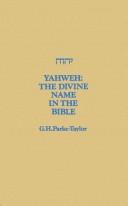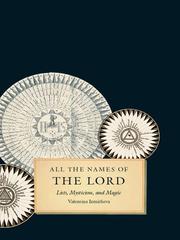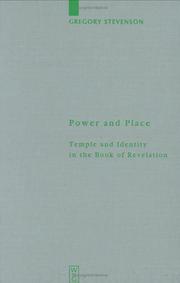| Listing 1 - 10 of 11 | << page >> |
Sort by
|

ISBN: 9780889206526 088920652X 0889200130 9780889200135 0889200149 9780889200142 1282232614 9781282232617 9786613810359 6613810355 Year: 1975 Publisher: Waterloo, Ont.
Abstract | Keywords | Export | Availability | Bookmark
 Loading...
Loading...Choose an application
- Reference Manager
- EndNote
- RefWorks (Direct export to RefWorks)
Biblical tradition asserts that the revelation of God to Moses in the burning bush involved also a declaration of the divine name, the Tet (represented by the letters Y, H, W, H), and its meaning. There are indications that the divine name was known prior to the time of Moses, although ultimate questions of origin and precise meaning are shrouded in obscurity. IN fact, even the exact pronunciation of the name (usually pronounced YAHWEH) is by no means certain. The author of The Divine Name in the Bible surveys the immense literature on this subject, and traces the use of various names for deity in Israel from patriarchal times onwards, with special attention to the significance of the Tetragrammaton, which in course of time, became the name by which the God of Israel was known. Various aspects of the theological meaning of the name in the Old Testament writings are explored. The Dead Sea Scrolls, the Jewish Talmudic literature, and later mystical writings are also examined. The translators of the Old Testament into Greek used Kyrios as the equivalent for YHWH—with implications for the New Testament understanding of the person of Jesus Christ, reflected also in subsequent Christological formulations.
Book
ISBN: 1282776657 9786612776656 1443823082 9781443823081 9781443822879 1443822876 Year: 2010 Publisher: Newcastle upon Tyne Cambridge Scholars Publishing
Abstract | Keywords | Export | Availability | Bookmark
 Loading...
Loading...Choose an application
- Reference Manager
- EndNote
- RefWorks (Direct export to RefWorks)
Although religious innovation in America has historically been the norm rather than the exception, mainstream Americans have often viewed new religious movements Other suspicion and occasionally Other outright alarm. The question motivating many studies of new religious movements has been "why would someone join these religions?" In Antiquity and Social Reform, Dawn Hutchinson offers at least one answer to this often repeated query. She argues that followers of new religious movements in the 19...
Experience (Religion) --- Wicca. --- Unification Church. --- Nation of Yahweh.
Book
ISBN: 1501500228 1614512361 9781614512363 9781501500220 9781614512936 1614512930 Year: 2015 Publisher: Boston : De Gruyter,
Abstract | Keywords | Export | Availability | Bookmark
 Loading...
Loading...Choose an application
- Reference Manager
- EndNote
- RefWorks (Direct export to RefWorks)
"This book investigates the issue of the singularity versus the multiplicity of ancient Near Eastern deities who are known by a common first name but differentiated by their last names, or geographic epithets. It focuses primarily on the Ishtar divine names in Mesopotamia, Baal names in the Levant, and Yahweh names in Israel"--
God --- God (Judaism) --- Elohim --- Jehovah --- Yahveh --- Yahweh --- Yehovah --- Yhwh --- Metaphysics --- Misotheism --- Theism --- Name --- Name. --- Ishtar (Assyro-Babylonian deity) --- Baal --- Baal Shamen --- Baal Shemin --- Bel --- Baal (Canaanite deity) --- Ishtar --- Ištar --- Inanna --- Astarte --- Gods, Canaanite --- Ancient Near Eastern deities. --- Divine epithets.
Book
ISBN: 9783110195712 9783110252323 3110252325 3110195712 1283400111 9786613400116 Year: 2011 Volume: 62 4/1 Publisher: Berlin Walter de Gruyter
Abstract | Keywords | Export | Availability | Bookmark
 Loading...
Loading...Choose an application
- Reference Manager
- EndNote
- RefWorks (Direct export to RefWorks)
Das Corpus Dionysiacum Areopagiticum ist eine mit Randkommentaren (sogenannten Scholien) versehene Sammlung von vier Abhandlungen (De divinis nominibus; De caelesti hierarchia; De ecclesiastica hierarchia; De mystica theologia) und zehn Briefen (Epistulae) des Dionysius Areopagita, eines christlichen Schriftstellers des sechsten nachchristlichen Jahrhunderts. Nachdem die vier Abhandlungen und die zehn Briefe (in zwei Bänden als Corpus Dionysiacum Areopagiticum I und II, = PTS 33 und 36) bereits herausgegeben wurden, folgen nun die Randkommentare (in den Bänden Corpus Dionysiacum Areopagiticum IV 1, IV 2, V 1 sowie V 2).Dionysius Areopagita zählt zu den bedeutendsten Autoren der Philosophie und Theologie und daher auch zu den meistkommentierten Autoren der Spätantike, des Mittelalters und der Renaissance. Als Folge dieser ausgedehnten Kommentartradition reicht seine Wirkung über die Scholastik und den Deutschen Idealismus bis ins 20. Jahrhundert hinein. Einen wesentlichen Anteil an dieser Wirkmacht haben die ersten Randkommentare des Johannes von Skythopolis, die als redaktioneller Teil des Corpus Dionysiacum Areopagiticum die Abhandlungen und Briefe des Dionysius Areopagita in den ersten Jahrhunderten ihrer Verbreitung stets begleiteten und durch kommentierende Zusätze weiterer Scholiasten erweitert wurden. Alle diese Randkommentare (Scholien) bestehen aus dem Lemma, d.i. der Verweis auf die Textpartie, und dem Interpretament, d.i. die eigentliche Erklärung. Das einzelne Scholion ist Teil des Kommentares, d.h. der fortlaufenden Erklärung des Textes, die gleichsam aus mehreren aneinander gereihten Scholien besteht und sich auf alle Wissensbereiche erstreckt. Durch die Notierung der Scholie am Rand des Textes kommt es zu einer praktischen Verbindung zwischen Kommentar und Text.Die Übersetzung dieser Scholien ins Lateinische durch Anastasius Bibliothecarius ermöglichte und erleichterte die Auseinandersetzung des lateinischen Westens mit den griechisch verfassten Abhandlungen des Dionysius Areopagita. Band IV 1 enthält Prolog und Randkommentare des Johannes von Skythopolis zum Traktat De divinis nominibus des Dionysius Areopagita mit kommentierenden Zusätzen weiterer Scholiasten.
God (Christianity) --- Name --- Pseudo-Dionysius, --- Theology --- 276 =75 EPIPHANIUS SALAMINIUS --- Griekse patrologie--EPIPHANIUS SALAMINIUS --- Elohim --- Jehovah --- Yahveh --- Yahweh --- Yehovah --- Yhwh --- John, --- Ioannes, --- Johannes, --- Giovanni, --- God (Christianity) - Name --- Pseudo-Dionysius, - the Areopagite - De divinis nominibus --- Anastasius Bibliothecarius. --- Ancient Church. --- Dionysius Areopagita. --- Johannes of Skythopolis. --- Maximus Confessor.
Book
ISBN: 9781501765667 1501765663 9781501765650 Year: 2022 Publisher: [Place of publication not identified]
Abstract | Keywords | Export | Availability | Bookmark
 Loading...
Loading...Choose an application
- Reference Manager
- EndNote
- RefWorks (Direct export to RefWorks)
Sergii Bulgakov (1871-1944) wrote the book in response to a theological controversy that erupted in Russia just before the outbreak of World War I. Bulgakov develops a philosophy of language that aims to justify the truthfulness of the statement 'the Name of God is God himself', a claim provoking debate on the meaning of names, and the Name of God in particular. 'Philosophy of the Name' investigates the nature of words and human language, considers grammar and parts of speech, and concludes with an exposition on the Name of God.
God (Christianity) --- Word of God (Christian theology) --- God's Word (Christian theology) --- Word of God (Theology) --- Word of the Lord (Christian theology) --- Theology, Doctrinal --- Word (Theology) --- Elohim --- Jehovah --- Yahveh --- Yahweh --- Yehovah --- Yhwh --- Name. --- Filosofiia imeni, philosophy of language, russian orthodox theology of names, name glorifying,. --- Language and languages --- Religious aspects --- Christianity.
Book
ISBN: 9781575068190 9781575068527 1575068524 9781575068527 Year: 2013 Volume: 60 Publisher: Winona Lake, Ind. : Eisenbrauns,
Abstract | Keywords | Export | Availability | Bookmark
 Loading...
Loading...Choose an application
- Reference Manager
- EndNote
- RefWorks (Direct export to RefWorks)
Names in the Bible. --- Names, Personal --- God (Judaism) --- 221.08*01 --- Elohim --- Jehovah --- Yahveh --- Yahweh --- Yehovah --- Yhwh --- Anthroponomy --- Baby names --- Christian names --- Family names --- Forenames --- Names of families --- Names of persons --- Personal names --- Surnames --- Names --- Onomastics --- Hebrew personal names --- Hebrew. --- Semitic. --- Name. --- Theologie van het Oude Testament: God--(Godsleer) --- Jewish --- 221.08*01 Theologie van het Oude Testament: God--(Godsleer) --- Names in the Bible --- Name --- Hebrew --- Semitic --- Semitic personal names

ISBN: 1281957208 9786611957209 0226388727 9780226388724 9781281957207 9780226388700 0226388700 6611957200 Year: 2008 Publisher: Chicago : University of Chicago Press,
Abstract | Keywords | Export | Availability | Bookmark
 Loading...
Loading...Choose an application
- Reference Manager
- EndNote
- RefWorks (Direct export to RefWorks)
Christians face a conundrum when it comes to naming God, for if God is unnamable, as theologians maintain, he can also be called by every name. His proper name is thus an open-ended, all-encompassing list, a mystery the Church embraces in its rhetoric, but which many Christians have found difficult to accept. To explore this conflict, Valentina Izmirlieva examines two lists of God's names: one from The Divine Names, the classic treatise by Pseudo-Dionysius, and the other from The 72 Names of the Lord, an amulet whose history binds together Kabbalah and Christianity, Jews and Slavs, Palestine, Provence, and the Balkans. This unexpected juxtaposition of a theological treatise and a magical amulet allows Izmirlieva to reveal lists' rhetorical potential to create order and to function as both tools of knowledge and of power. Despite the two different visions of order represented by each list, Izmirlieva finds that their uses in Christian practice point to a complementary relationship between the existential need for God's protection and the metaphysical desire to submit to his infinite majesty-a compelling claim sure to provoke discussion among scholars in many fields.
God (Christianity) --- Elohim --- Jehovah --- Yahveh --- Yahweh --- Yehovah --- Yhwh --- Name. --- 231.133.12 --- 291.214 --- 291.214 Goden: personifieerde abstracties en zuivere geesten --- Goden: personifieerde abstracties en zuivere geesten --- 231.133.12 Namen van God --- Namen van God --- Name --- divinity, god, mysticism, spirituality, religion, magic, christianity, dionysius the areopagite, myth, authorship, kabbalah, 72 names, naming, bible, hierarchy, nameless, exegesis, scripture, apostle, tower of babel, septuagint, printing, miscellany for travelers, abagar, judaism, nonfiction, metaphysics, balkans, palestine, provence, history.

ISBN: 3110170086 3110880393 9783110880397 9783110170085 9783110170085 Year: 2001 Volume: 107 Publisher: Berlin New York
Abstract | Keywords | Export | Availability | Bookmark
 Loading...
Loading...Choose an application
- Reference Manager
- EndNote
- RefWorks (Direct export to RefWorks)
Archaeological, epigraphic, numismatic, and historical research is used to illuminate the meaning and function of temples in both Jewish and Greco-Roman cultures. This evidence is then brought into a dialogue with a literary analysis of how the temple functions as a symbol in Revelation. Die Bedeutung und Funktion von Tempeln sowohl in der jüdischen wie auch der griechisch-römischen Kultur wird mittels archäologischer, epigraphischer, numismatischer und historischer Forschung erhellt. Die Ergebnisse werden dann in einer Textanalyse der biblischen Johannesoffenbarung angewendet. Leitend ist dabei die Fragestellung, wie in der Offenbarung auf den Tempel als bedeutungsreiches Symbol zurückgegriffen wird.
Temple of God --- 228 --- House of Yahweh --- Christian art and symbolism --- Holy Spirit --- Jewish art and symbolism --- Mystical union --- Presence of God --- Apocalyps. Boek der Openbaring van Johannes. Apocalyptiek --- Symbolism --- Bible. --- Abūghālimsīs --- Apocalipse (Book of the New Testament) --- Apocalisse (Book of the New Testament) --- Apocalypse (Book of the New Testament) --- Apocalypse of John --- Apocalypse of St. John --- Apocalypsis Johannis --- Apocalypsis S. Johannis --- Apokalypse (Book of the New Testament) --- Apokalypsin --- Book of Revelation --- Johannes-Apokalypse --- Johannesapokalypse --- Johannesoffenbarung --- Offenbarung des Johannes --- Revelation (Book of the New Testament) --- Revelation of St. John --- Revelation of St. John the Divine --- Revelation to John --- Ruʼyā (Book of the New Testament) --- Sifr al-Ruʼyā --- Yohan kyesirok --- Criticism, interpretation, etc. --- Temple of God. --- Apokalipsa św. Jana --- Apokalipsa świętego Jana
Book
ISBN: 1400889707 9781400889709 Year: 2018 Publisher: Princeton, NJ Princeton University Press
Abstract | Keywords | Export | Availability | Bookmark
 Loading...
Loading...Choose an application
- Reference Manager
- EndNote
- RefWorks (Direct export to RefWorks)
F.E. Peters, a scholar without peer in the comparative study of Judaism, Christianity, and Islam, revisits his pioneering work. Peters has rethought and thoroughly rewritten his classic The Children of Abraham for a new generation of readers-at a time when the understanding of these three religious traditions has taken on a new and critical urgency.He began writing about all three faiths in the 1970s, long before it was fashionable to treat Islam in the context of Judaism and Christianity, or to align all three for a family portrait. In this updated edition, he lays out the similarities and differences of the three religious siblings with great clarity and succinctness and with that same remarkable objectivity that is the hallmark of all the author's work.Peters traces the three faiths from the sixth century B.C., when the Jews returned to Palestine from exile in Babylonia, to the time in the Middle Ages when they approached their present form. He points out that all three faith groups, whom the Muslims themselves refer to as "People of the Book," share much common ground. Most notably, each embraces the practice of worshipping a God who intervenes in history on behalf of His people.The book's text is direct and accessible with thorough and nuanced discussions of each of the three religions. Footnotes provide the reader with expert guidance into the highly complex issues that lie between every line of this stunning edition of The Children of Abraham. Complete with a new preface by the author, this Princeton Classics edition presents this landmark study to a new generation of readers.
Judaism --- Christianity. --- Islam --- Mohammedanism --- Muhammadanism --- Muslimism --- Mussulmanism --- Religions --- Muslims --- Christianity --- Church history --- Jews --- Semites --- History --- Religion --- Al-Ghazali. --- Apostasy. --- Apostolic Tradition. --- Asceticism. --- Avicenna. --- Bible. --- Caliphate. --- Canon law. --- Chosen people. --- Christ. --- Christian theology. --- Christian tradition. --- Christian. --- Christianity and Judaism. --- Christology. --- Church Fathers. --- Creed. --- Crucifixion of Jesus. --- Deity. --- Ecumenical council. --- Ekklesia (think tank). --- Essene. --- Essenes. --- Eucharist. --- Exegesis. --- Galilean. --- Gentile. --- Gnosticism. --- God. --- Hadith. --- Hebrew Bible. --- Heresy. --- Ideology. --- Ijtihad. --- Infidel. --- Islam. --- Israelites. --- Jewish Christian. --- Jewish prayer. --- Jews. --- Judaism. --- Judea (Roman province). --- Justification (theology). --- Kaaba. --- Kabbalah. --- Kafir. --- Kalam. --- Khawarij. --- Kohen. --- Law of Moses. --- Liturgy. --- Maimonides. --- Messiah in Judaism. --- Midrash. --- Mishnah. --- Mitzvah. --- Monotheism. --- Mosque. --- Muslim. --- Mysticism. --- New Covenant. --- New Testament. --- Old Testament. --- Paganism. --- Passover. --- People of the Book. --- Pharisees. --- Philosophy. --- Piety. --- Prophecy. --- Quran. --- Quraysh. --- Rabbinic Judaism. --- Recitation. --- Religion. --- Religious community. --- Religious text. --- Renunciation. --- Ritual purification. --- Sadducees. --- Sect. --- Sermon. --- Shafi'i. --- Sharia. --- Shia Islam. --- Spirituality. --- Sufism. --- Sunni Islam. --- Tafsir. --- Talmud. --- Theology. --- Torah in Islam. --- Torah. --- Ulama. --- Ummah. --- Veneration. --- Worship. --- Writing. --- Yahweh.
Book
Year: 2020 Publisher: Basel, Switzerland MDPI - Multidisciplinary Digital Publishing Institute
Abstract | Keywords | Export | Availability | Bookmark
 Loading...
Loading...Choose an application
- Reference Manager
- EndNote
- RefWorks (Direct export to RefWorks)
Israelite religions have always fascinated scholars. Initial studies used the Bible as their main source of information and attempted to read it critically in order to learn about the religion of ancient Israel. With the advent of modern research in the Near East, more and more information on other Ancient Near Eastern religions was accumulated and initially used to illuminate Israelite religious practices as described in the Bible, but gradually led to challenging some of the accepted truisms. The new information was collected mainly through archaeological excavations, and archaeology had gradually become a major player in the study of ancient Israelite religion(s) and religious practices. The massive amount of information on the various subthemes related to Israelite religions, the shifting trends in scholarship, the multiplicity of approaches, and the interdisciplinary nature of the field means that no single scholar can master all the data today. Indeed, there is currently no comprehensive and updated book that covers all or even most aspects pertaining to Israelite religion(s). This volume is a partial attempt to fill some of this lacuna. The volume includes a number of broad, summarizing studies, presenting readers with the up-to-date state of the research on a number of important issues, from Solomon’s temple to broader studies of the loci of cultic activity in ancient Israel through to analysis of the difference between the “official” and “popular” expression of religion, the place of women in Israelite cult(s), similarities and differences between the religious practices in Israel and Judah and those of other Iron Age religions, and the religion of some of Israel’s neighbors to the role of zooarchaeology in the study of religion, ancient Israelite festivals, and more.
Philistines --- Iron Age --- Aegean-style --- temples --- shrines --- household --- figurines --- Israelite religion --- ancient Israel --- cultic buildings --- sanctuaries --- biblical archaeology --- egalitarian ethos --- religion --- women --- Israel --- Judah --- domestic religion --- family religion --- rituals --- worship --- Jerusalem Temple --- feminist studies --- archaeology --- Hebrew Bible --- Old Testament --- Yahweh --- Asherah --- Tell el-Far‛ah North --- shrine model --- moon --- rain --- womb --- mercy --- household religion --- cult sites --- Transjordan --- Deir Alla --- Pella --- Damiyah --- Ataruz --- Mudayna Thamad --- WT-200 --- Busayrah --- Ammon --- sons of Ammon --- Ammonite --- gods --- Milkom --- iconography --- Jordan --- Solomon’s Temple --- Khirbet Qeiyafa --- Motza --- Kuntillet ʿAjrud --- theomachy --- theophany --- blessings --- Hebrew inscriptions --- scribal curriculum --- zooarchaeology --- sacrifice --- offering --- Yahwistic worship --- sacred feasting --- faunal remains --- animal bones --- cult --- ritual --- Tel Dan --- Late Bronze Age --- Canaan --- Egypt --- Israelite festivals --- Sabbath --- calendars --- pilgrimage festivals --- full-moon celebrations --- harvest celebrations --- firstborn rituals --- first produce rituals --- folk religion --- Bible --- Near Eastern archaeology --- archaeology and religion
| Listing 1 - 10 of 11 | << page >> |
Sort by
|

 Search
Search Feedback
Feedback About
About Help
Help News
News